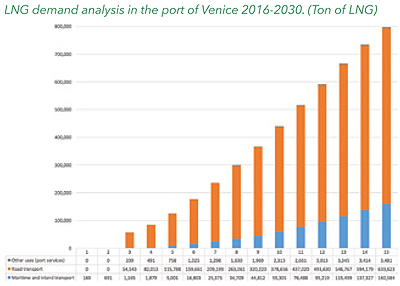 The port of Venice is at the intersection of the main European transport corridors and Motorways of the Sea. Thanks to its strategic position, it can act as a European gateway for trade flows to and from Asia. One harbor with three Ports of call:
The port of Venice is at the intersection of the main European transport corridors and Motorways of the Sea. Thanks to its strategic position, it can act as a European gateway for trade flows to and from Asia. One harbor with three Ports of call:
Venice cargo port facilities can count on 2.000 hectares of port logistics areas, being one of the major European Ports for project and general cargo and one of the main Ports in the Adriatic Sea for containers traffic. Furthermore, the Port of Venice is the first cruise Port in Europe and in Italy (Home In/Out Pax, 2015 – Report Medcruise, Cruise activities in Medcruise Ports 2015) and it counts on the Italian most modern Motorways of The Sea Terminal (Ro-Ro/Ro-Pax).
Focusing on environmental issues, the Venice Port Authority (VPA) is committed in many projects aimed at the preservation and improvement of Venice and its Lagoon, such as the restoration of the Venetian waterfront, the remediation of land and water and the use of alternative energies.
The environmental sustainability of Port activities is one of the VPA's main goals. In particular, the actions undertaken under the "Green Port Policy" focus on three main areas:
- - 1. Air: in addition to air quality monitoring and assessment, the Port has started up a number of projects aimed at cutting emissions and promoting the use of alternative energy.
- - 2. Water: the Port’s quaysides have been designed to avoid any contamination seeping from the land into either the lagoon or the water table.
- - 3. Land: Venice Port Authority set up a big campaign of soil remediation involving 110 ha, with 105 million € already invested
Since 2013, as part of its environmental policy, the Port of Venice has planned a set of activities to promote the use of LNG as an alternative fuel for both maritime and land transport modes.
 It all started in 2013, with the drafting of the North Adriatic Master Plan for the development of port infrastructure for LNG and other alternative energy sources as part of the Poseidon Med project. The demand analysis (see graph) shows that Venice has all the numbers to become the LNG distribution hub for the whole North Adriatic area for maritime and road transport sectors.
It all started in 2013, with the drafting of the North Adriatic Master Plan for the development of port infrastructure for LNG and other alternative energy sources as part of the Poseidon Med project. The demand analysis (see graph) shows that Venice has all the numbers to become the LNG distribution hub for the whole North Adriatic area for maritime and road transport sectors.
With EU co-funded Action, the whole project is currently being developed:
- - within the GAINN4CORE project (initiative promoted by the Italian Ministry of Infrastructure and Transport, in order to create the Italian alternative fuels network according to the Directive 2014/94/EU)
- - ENI will design and implement a pilot LNG refueling station with a capacity of about 150 [m3] able to supply a LNG demand of about 3.000 [ton/y], for both maritime and road uses; VPA will take care of studying the accessibility and safety aspects related to LNG storage and distribution, with respect to the above mentioned initiative;
- - within Poseidon Med2 project; the European Union has granted the co-funding of over € 9 million to the Rimorchiatori Riuniti Panfido for the construction of the first prototype of an innovative LNG powered ship designed by BMT Titron (England).
A larger LNG hub, is also planned as other port and logistics companies are ready to invest more than 80 mio € on bunkering, maritime and road refueling
stations.
